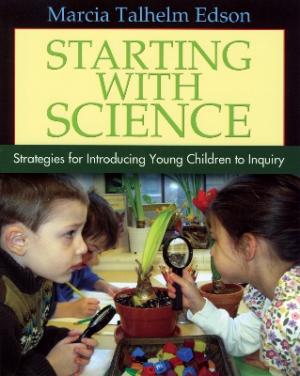
Starting With Science: Strategies for Introducing Young Children to Inquiry
In Starting with Science, Marcia Talhelm Edson has eloquently pieced together practical ideas on how to promote lifelong learning among our littlest learners through problem-based inquiries in any science classroom. Edson also effectively weaves in cross-curricular learning opportunities by integrating literacy (emphasizing the importance of writing in science), holistic assessment (observing interactions, listening to conversations, posing probing questions to lead discussions), and formal assessment opportunities (descriptive feedback on observed behaviours during an activity, interview questions, writing samples, drawings, etc.) to maximize learning outcomes.
Edson has years of practice as a clinical assistant professor in the field of education and experience as a classroom teacher, which lends greater credibility and weight to her ideas for implementing effective early childhood learning strategies. Much of her analysis is drawn through collaborative classroom discussions, student exemplars, and teacher commentaries, which provide personal narratives to support and disseminate the value of inquiry- based learning early on in a child’s school life.
The underlying assumption in this valuable resource is that teachers do not need to have a strong science background in order to be effective facilitators of scientific learning. In fact, the focus of inquiry-based lessons is that students steer scientific inquiry through exploration, discovery, discussion, and understanding of the world around them while teachers operate as facilitators who are open to taking a risk by allowing the content to emerge over time and by admitting to not knowing everything. Each class may have a unique outcome but the eventual result is that young children are learning to be innovative thinkers. In this regard, curriculum content is covered but in an engaging and non-judgmental manner.
Overall, this resource provides relevant and practical advice with reference to real life classroom scenarios. It demonstrates the outcome of students learning science without boundaries and shows the value of teachers sharing commentaries on how an inquiry- based approach has impacted the teaching of science in their classrooms. It would make a valuable addition to any classroom, specifically for teachers of core science at the pre-K, kindergarten, and early elementary level.
Sofia Saleem is a member of The Elementary Teachers of Toronto.